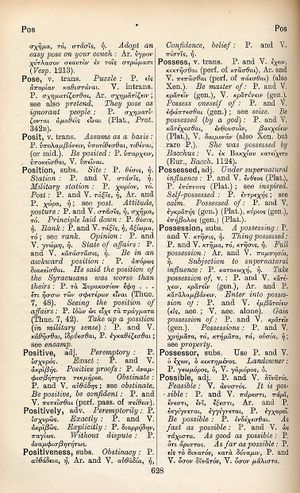positive: Difference between revisions
From LSJ
Πολλοὺς τρέφειν εἴωθε τἀδικήματα → Multos consuevit alere iniuria et nefas → Gar viele sind's, die Unrechttun zu nähren pflegt
(CSV4) |
(D_7) |
||
| Line 6: | Line 6: | ||
<b class="b2">Obstinate</b>: P. and V. [[αὐθάδης]]; see [[obstinate]]. | <b class="b2">Obstinate</b>: P. and V. [[αὐθάδης]]; see [[obstinate]]. | ||
<b class="b2">Be positive, be confident</b>: P. and V. πεπεῖσθαι (perf. pass. of πείθειν). | <b class="b2">Be positive, be confident</b>: P. and V. πεπεῖσθαι (perf. pass. of πείθειν). | ||
}} | |||
{{Gaffiot | |||
|gf=<b>pŏsĭtīvē</b> ([[positivus]]), au positif : Prisc. Gramm. 17, 61. | |||
}} | }} | ||
Revision as of 07:01, 14 August 2017
English > Greek (Woodhouse)
adj.
Peremptory: P. ἰσχυρός. Exact: P. and V. ἀκριβής. Positive proofs: P. ἀναμφισβήτητα τεκμήρια. Obstinate: P. and V. αὐθάδης; see obstinate. Be positive, be confident: P. and V. πεπεῖσθαι (perf. pass. of πείθειν).
Latin > French (Gaffiot 2016)
pŏsĭtīvē (positivus), au positif : Prisc. Gramm. 17, 61.

